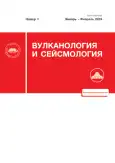Asymmetrical seismic pulses before a large earthquake
- Authors: Sobolev G.A.1, Zakrzhevskaya N.A.1, Kireenkova S.M.1
-
Affiliations:
- Schmidt Institute of Physics of the Earth, Russian Academy of Sciences
- Issue: No 1 (2019)
- Pages: 3-13
- Section: Articles
- Published: 04.03.2019
- URL: https://journals.eco-vector.com/0203-0306/article/view/11202
- DOI: https://doi.org/10.31857/S0203-0306201913-13
- ID: 11202
Cite item
Abstract
This study is concerned with the behavior of seismic noise in the period range of a few minutes based on records made by broadband IRIS stations before the catastrophic earthquake of March 11, 2011 in Japan. A formalized technique was used to identify discrete asymmetrical pulses whose amplitudes were an order of magnitude higher than the noise level and that were spaced at intervals longer than 30 minutes. The frequency of pulses at the MAJO station on Honshu 400 km of the earthquake epicenter increased on January 30, 2011 and remained high until March 2, 2011. No such phenomena have been observed at MAJO in the same periods during the preceding 15 years, when the station was in regular operation. The records of other similar stations farther than 1700 km from the epicenter were not found to contain increases in the rate of pulses. We believe that these asymmetrical pulses were due to dilatancy in shallow crustal layers beneath the MAJO station.
Keywords
Full Text
About the authors
G. A. Sobolev
Schmidt Institute of Physics of the Earth, Russian Academy of Sciences
Author for correspondence.
Email: sobolev@ifz.ru
Russian Federation, 10-1, Bolshaya Gruzinskaya str., Moscow 123242
N. A. Zakrzhevskaya
Schmidt Institute of Physics of the Earth, Russian Academy of Sciences
Email: sobolev@ifz.ru
Russian Federation, 10-1, Bolshaya Gruzinskaya str., Moscow 123242
S. M. Kireenkova
Schmidt Institute of Physics of the Earth, Russian Academy of Sciences
Email: sobolev@ifz.ru
Russian Federation, 10-1, Bolshaya Gruzinskaya str., Moscow 123242
References
- Алексеев А.С., Белоносов А.С., Петренко В.Е. О концепции многодисциплинарного прогноза землетрясений с использованием интегрального предвестника // Проблемы динамики литосферы и сейсмичности // Вычислительная сейсмология. Вып. 32. М.: ГЕОС, 2001. С. 81–97.
- Кугаенко Ю.А., Павлов В.М., Иванова Е.И и др. Толудская вспышка сейсмичности и землетрясение 30.11.2012 г. (MC = 5.4, MW = 4.8), сопровождавшие начало Толбачинского извержения 2012–2013 гг. // Вулканология и сейсмология. 2017. № 6. С. 33–48.
- Любушин А.А. Анализ данных систем геофизического и экологического мониторинга. М.: Наука, 2007. 228 с.
- Марапулец Ю.В., Шевцов Б.М., Ларионов И.А. и др. Отклик геоакустической эмиссии на активизацию деформационных процессов при подготовке землетрясений // Тихоокеанская геология. 2012. Т. 31. № 6. С. 59–67.
- Мельхиор П. Земные приливы. М.: Мир, 1968. 454 с.
- Родкин М.В. Изменение характера сейсмичности с глубиной: новые эмпирические соотношения и их интерпретация // Физика Земли. 2004. № 10. С. 63–72.
- Рыков А.В. К проблеме наблюдений колебаний Земли. Аппаратура, методы и результаты сейсмометрических наблюдений // Сейсмические приборы. 1979. Вып. 12. С. 3–8.
- Салтыков В.А., Кугаенко Ю.А. Развитие приповерхностных зон дилатансии как возможная причина аномалий в параметрах сейсмической эмиссии перед сильными землетрясениями // Тихоокеанская геология. 2012. Т. 31. № 1. С. 96–106.
- Салтыков В.А. О возможности использования приливной модуляции сейсмических шумов в целях прогноза землетрясений // Физика Земли. 2017. № 2. С. 84–96.
- Соболев Г.А. Низкочастотный сейсмический шум перед землетрясением Тохоку 11 марта 2011 г. с магнитудой 9 // Физика Земли. 2011. № 12. С. 11–22.
- Соболев Г.А., Соболев Д.Г., Мигунов И.Н., Закржевская Н.А. Некоторые свойства низкочастотного сейсмического шума // Физика Земли. 2014. № 4. С. 15–24.
- Соболев Г.А., Закржевская Н.А., Соболев Д.Г., Петров В.А. Проявление триггерного эффекта в региональной сейсмичности // Вулканология и сейсмология. 2017. № 2. С. 3–13.
- Brace W.F., Paulding B.W., Scholz C.H. Dilatancy i the fracture of crystalline rocks // J. Geophys. Res. 1966. V. 71. P. 3939–3948.
- Ekstrom G. Time domain analysis of Earth’s long-period background seismic radiation // J. Geophys. Res. 2001.V.106. № B11. P. 26483–26493.
- Hardle W. Applied nonparametric regression. Cambridge, N. Y., New Rochell, Melbourne, Sydney: Cambridge University Press, 1989. (Русский перевод: Хардле В. Прикладная непараметрическая регрессия. М.: Мир, 1993. 349 с.).
- Kobayashi N., Nishida K. Continuous excitation of planetary free oscillations by atmospheric disturbances // Nature. 1998. V. 395. P. 357–360.
- Satoshi Ide, Beroza G.C., Shelly D.R., Uchide T. A scaling law for slow earthquakes // Nature. Letters. 2007. V. 447/3. P. 76–79.
- Scholz C.H., Sykes L.R., Aggarwall Y.P. Earthquake prediction: a physical basis // Science. 1973. V. 181. P. 803–810.
- Sobolev G.A., Lyubushin A.A. Using modern seismological data to reveal earthquake. Precursors // Russian Journal of Earth Sciences. 2007. V. 9. ES 2005. doi: 10.2205/2007ES000220.
- Wieland E., Streckeisen G. The leaf-spring seismometer – design and performance // Bull. Seismol. Soc. Amer. 1982. V. 72. P. 2349–2367.
Supplementary files













